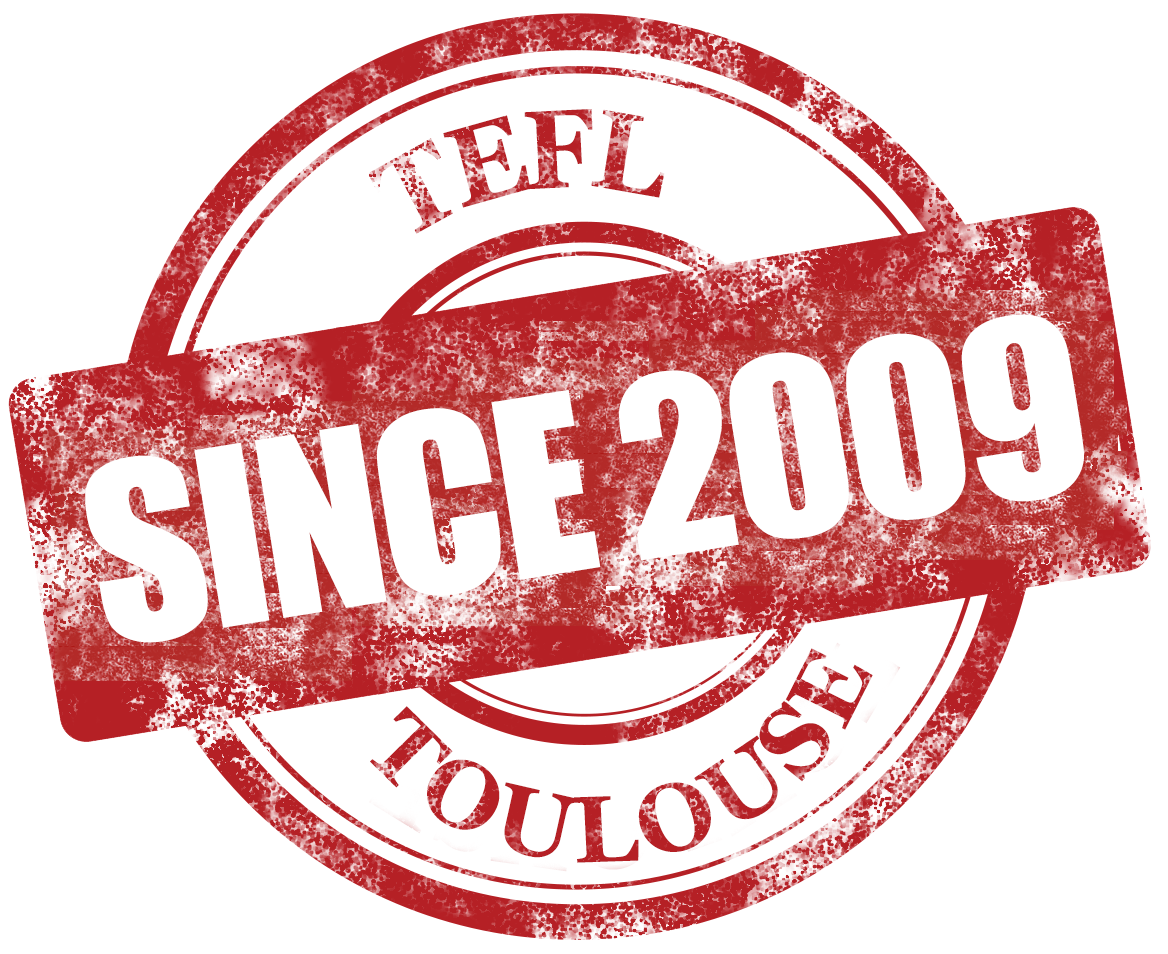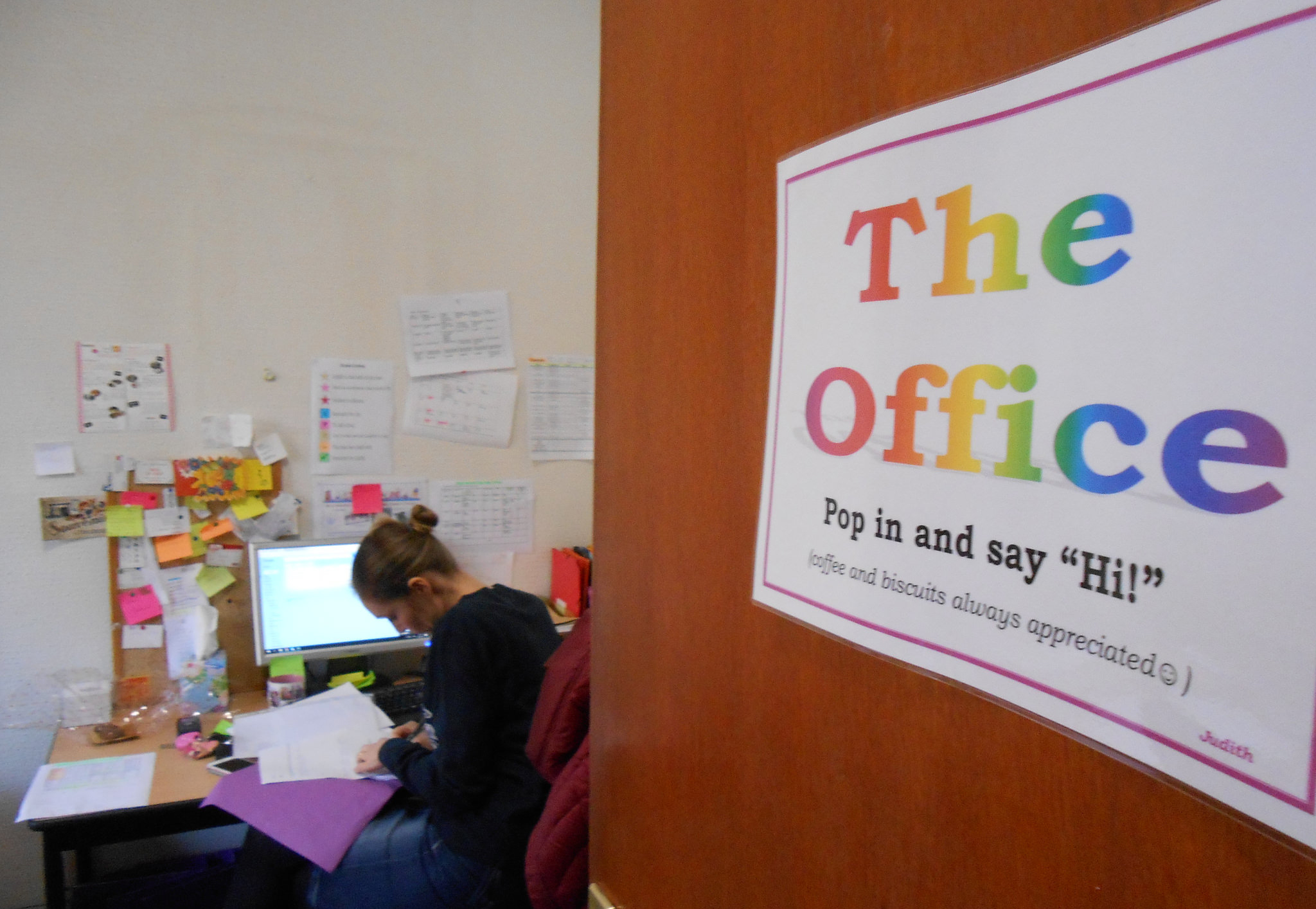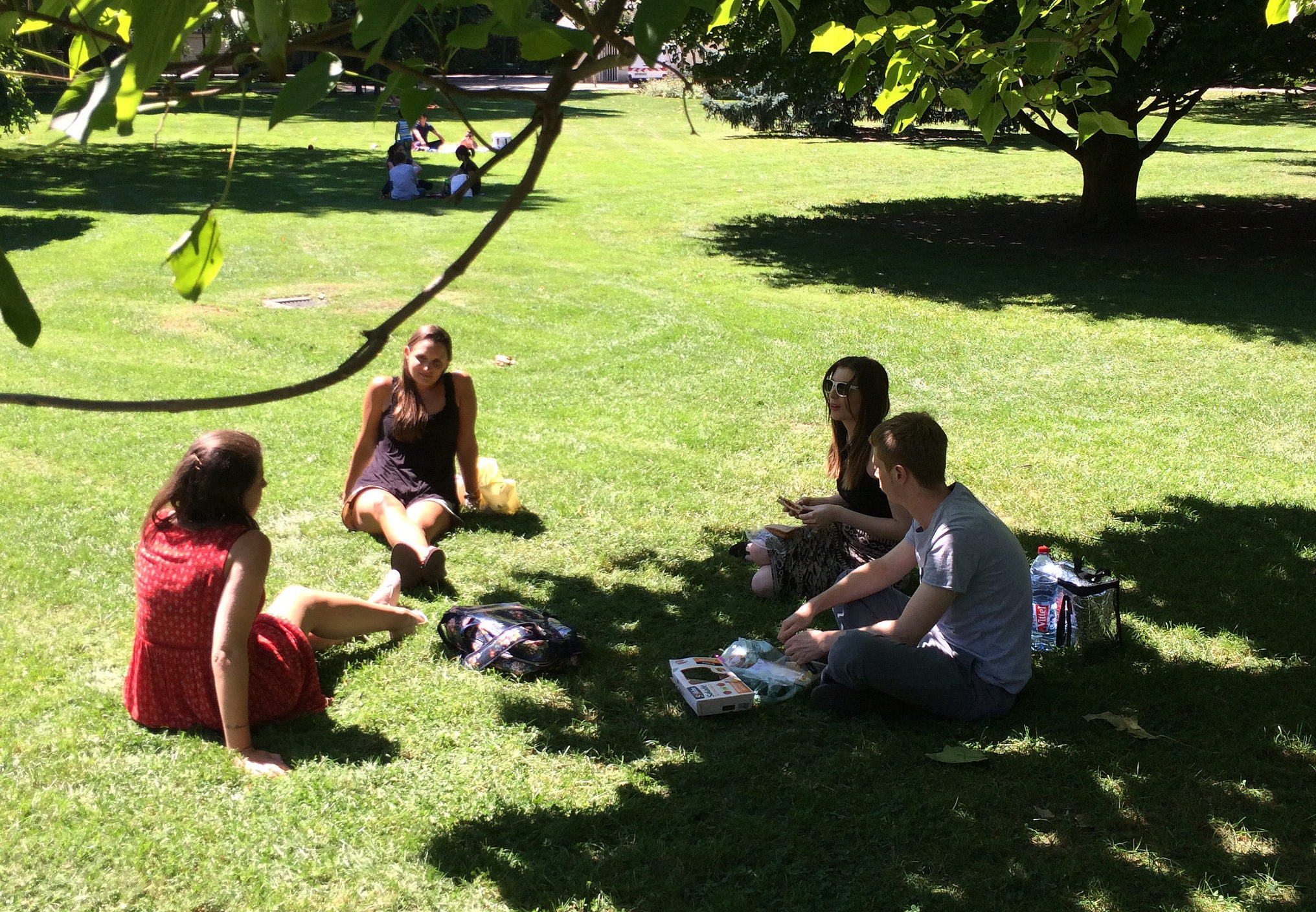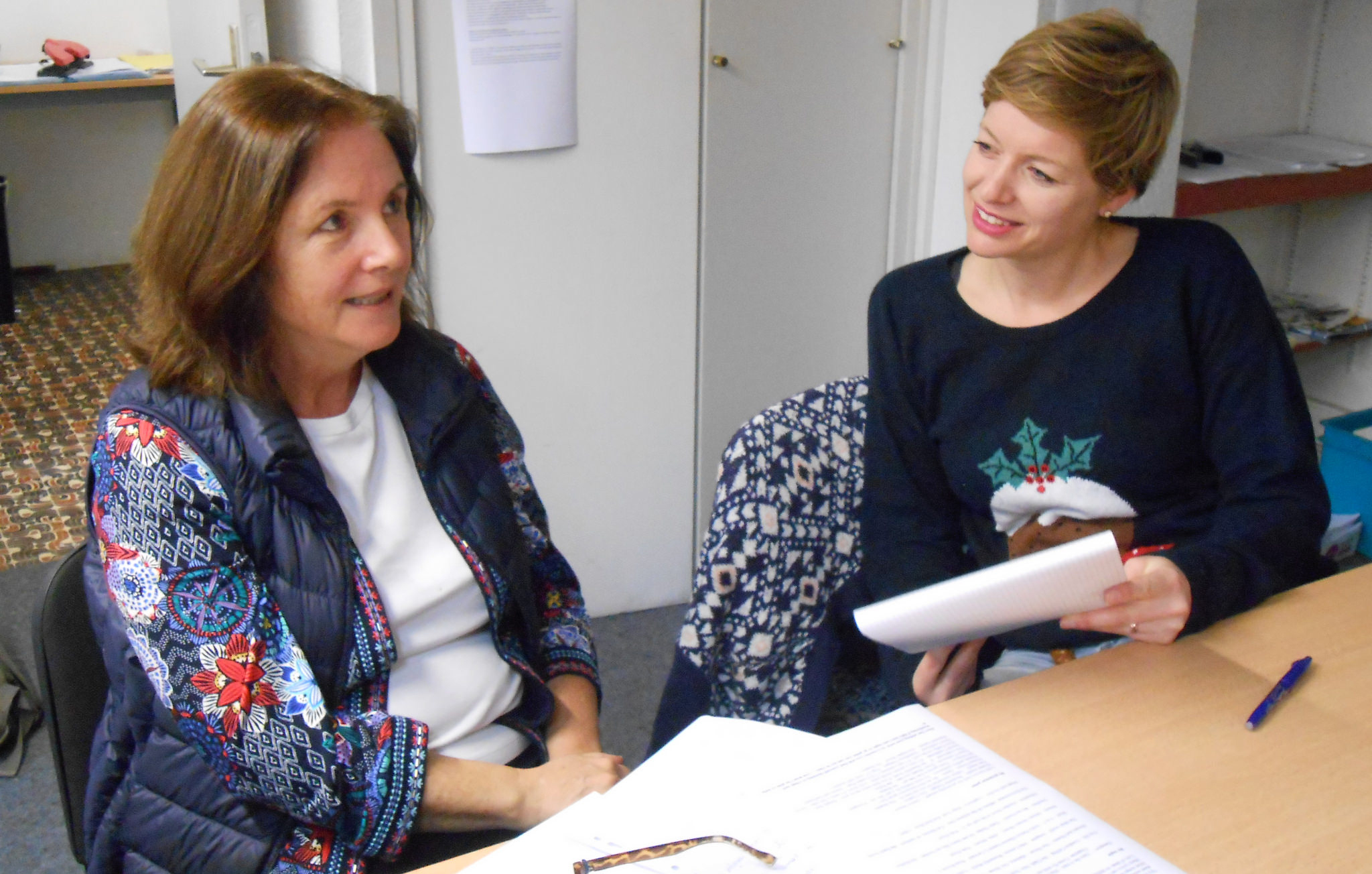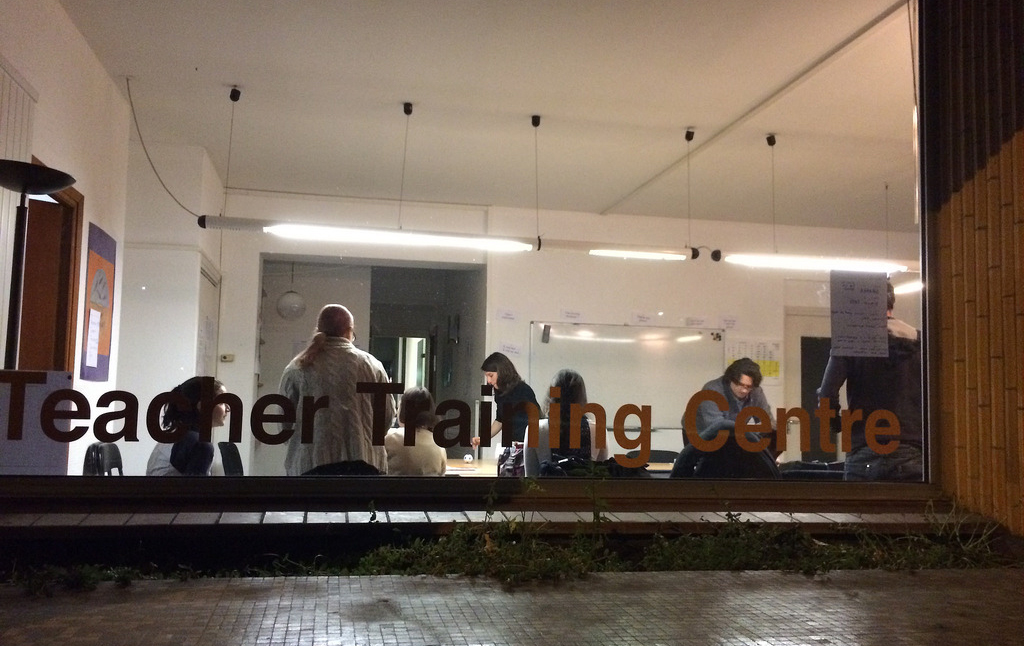Overview:
The in-class course runs from 9 am to 6.30pm from Monday to Thursday for 5 weeks, and provides you with the knowledge and practical skills you need to start teaching English professionally in France and around the world. Successful trainees are awarded with the IATQUO accredited Certificate in TEFL at the end of the 5 weeks, as well as our own TEFL Toulouse Certificate in TEFL.
- The course costs 1900 euros
- We can organise accommodation for you
- You don’t need to be a native speaker of English
- Most people won’t need any sort of visa to come to France and do the course
- Non EU passport holders who wish to stay on to live and work in France will need to purchase our TEFL + French package
You’ll usually teach 6 x 1 hour lessons to real students. We offer free English lessons every afternoon to local residents, and these are the people you will teach. They are usually French but can be from other non-English speaking countries such as Spain or Latin America. Average age is about 45 years old. The students are very nice and understand that you are in training, so they don’t usually ask you tricky grammar questions!
You’ll learn how to teach online TEFL lessons, as well as in-class lessons. This is a great way of topping up income wherever you are in the world, and you can teach as you travel! You will discover the different approaches that online teaching requires and of course how to execute lessons using platforms such as Zoom, Microsoft teams, and Skype. For those who want to become experts in everything online, we also offer an add -on course in educational technology in TEFL
You will learn how to teach lessons with just you and one student, how to diagnose and fulfil an individual TEFL student’s needs and objectives, identify language issues, and plan a tailor-made series of English lessons for the student
You’ll observe around 5 hours worth of lessons taught by experienced TEFL teachers, and will also have the chance to watch the other people on your course teach. You learn so much by watching each other!
You’ll receive lessons on all the most important aspects of English grammar, including:
- Parts of speech
- Present, past and perfect tenses
- Tense and time (not the same thing!)
- Referring to the future
- Conditional structures
- Auxiliary verbs, modal verbs, phrasal verbs
- Passive structures
- Reported speech
- More complex elements of vocabulary, eg collocation
- Articles
- Form and function
You’ll learn the different phonological (pronunciation) features of English, including:
- The consonant sounds and symbols
- The vowel sounds and symbols
- Diphthongs
- Intonation and how it changes meaning
- Stress within words in English
- Stress within sentences and weak forms
- Connected speech
- Regional and international variations of English
- Articulation
Teaching English isn’t just about grammar and phonology. Other theory sessions include:
- How to present new language in context
- Teaching grammar
- Teaching vocabulary
- Improving your students’ speaking skills
- Improving your students’ listening skills
- Improving your students’ writing and reading skills
- Lesson planning – various approaches, such as PPP, PWP, ARC, TTT, TBL….
- Lesson activities and games toolbox
- Eliciting and concept checking new language
- Using authentic materials and music in the EFL classroom
- Using dictation
- Teaching Business English
- Teaching Young Learners
- Teaching exam classes
- Error correction techniques
- Teacher language
- Educational Technology and online teaching
You’ll learn how to plan lessons effectively using techniques such as PPP, PWP, ARC, TTT, TBL and how to establish appropriate learner objectives and make sure they are met. Also how to plan the individual stages of a lesson, anticipate problems that may arise during lessons and be prepared with solutions. We also look at:
- Learning to plan a lesson using established “scaffolding” methods such as PPP, PWP
- More advanced approaches to lesson planning, such as ARC and TBL
We look at some different theories regarding how humans learn a language and some different approaches we can take when teaching it, as well as the importance of considering how different people learn differently
- Basic principles of TEFL
- Language “skills” and “systems”
- Historical approaches to language teaching
- Learner styles
In these input sessions you’ll learn how to incorporate published course books and different types of authentic materials in your lessons.
- Exploiting authentic materials – eg music, leaflets/ brochures- in the classroom
- Using coursebooks in the classroom – selecting and rejecting
- Using technology in the classroom and teaching online
You’ll learn how to deal with difficult situations that can arise in the TEFL classroom (adults, teenagers and 5 to 12’s) and different student profiles, as well as how to organise your physical classroom effectively.
How are Business English classes different to General English classes? You’ll learn how to teach business English students, improving their ability to give presentations, negotiate, deal with phone calls, participate in meetings socialise, take part in video conferencing… we also offer an add on course in how to teach Business English which involves a behind the scenes look at how a local Toulouse language school operates
How do you control and harness the energy of a class of teenagers in the TEFL classroom? Or 6 year olds? You’ll learn how to teach the 5 to 11 and 12 to 16 age groups, some different approaches and activities that you can use to teach kids and teenagers, as well as online tools such as Kahoot, that can keep them happy! If you want more, we offer an extra add-on module in TEYL
During the course you’ll have several one to one tutorials with your trainer to discuss your progress and answer any questions you have about what we have covered on the course
Every afternoon, time is set aside for lesson planning help. Our experienced TEFL trainers come to the training centre daily to help you plan your lessons. Note that many TEFL courses don’t offer this, they just have “someone available during lunchtime”, which means you miss your lunch if you want to get help with your upcoming lesson!
We give you a two hour session to provide help and advice regarding finding a TEFL job, including CV and interview tips and techniques for TEFL teachers, where and how to look for TEFL work, and how to set up as a freelancer (auto-entrepreneur) in France. We can put you in touch with ex trainees around the world! You get lifetime job guidance with us, we are here to help even 10 years after you graduate.
TEFL Toulouse course assessment:
Here’s how you’ll be assessed:
You are given 3 grades, so if all goes well your TEFL certificate will look something like this:
- Teaching Practice: Pass
- Theory: Strong Pass
- Professionalism: Strong Pass
The possible grades for each category are Pass or Strong Pass. There is also a Below Pass grade, and if you obtain this grade repeatedly you will need to book further teaching practices or submit further written work if you still want to go for certification. Don’t worry, many people get a Below Pass grade for something, but you can make it up with other Pass or Strong Pass grades.
There is no final exam you’ll be pleased to hear! We use continual assessment.
You’ll need to show that you can reflect on your own teaching and put into practice previously given feedback. We take the average of your 6 grades for the lessons you teach, with a particular emphasis on the last few.
You’ll need to show that you can reflect on your own teaching and put into practice previously given feedback. We take the average of your 6 grades for the lessons you teach, with a particular emphasis on the last few.
This is made up of:
The One to One project – 40% of total theory grade
This project is set in week 2 and submitted at the latest over the weekend just after the course ends. You’ll choose a student, diagnose his or her needs in English, then design a lesson based on this diagnosis, teach it, and evaluate it in depth. Finally you’ll design an imaginary further short course of study for the student. It’s quite a big essay but builds up bit by bit as the weeks go by. It really impresses employers!
Two grammar and phonology tests – 20% each of total theory grade
We’ll assess you on how well you’ve assimilated the English grammar and phonology input on the course, with 2 grammar tests. These only test you on what we have covered on the course, no previous knowledge is tested!
Unknown Foreign Language Observation Task – 10% of total theory grade
You’ll have one or two beginner lessons in a language that you probably don’t speak, and write a short essay based on this experience. Through this you’ll gain an insight into how it feels to be one of your future students, being spoken to in a new language. The aim is to help you adapt teaching methods to find other ways of getting our meaning across, and to help you empathise globally to a greater extent with your beginner students.
Video demo lesson task – 10% of total theory grade
You watch a video of a lesson and answer a series of questions about what you see
You need to be professional on the course to gain certification. This means: Being present and on time, communicating any problems to us immediately, being enthusiastic about English and teaching, being non defensive, open to course content and trainers’ comments, well organised, smart / casually dressed (no need to dress up!) and a “people person”. It’s common sense really.
“I just wanted to say thank you for the course, I enjoyed it, and I learnt a lot. After leaving, I went to Vietnam for three months volunteering teaching English. I travelled for a month in Taiwan and now I’m back in Vietnam teaching full time (and paid this time not volunteering!). I’ve been back a month already, I teach in public schools, from 3 to 11 year olds, they’re so cute and funny. I’m staying here for at least six months, after that maybe back to Toulouse, I don’t know yet. The TEFL certificate has definitely made a lot of difference, as it’s what everyone asks for here, so I just wanted to say a big thank you for helping with that! I wish you all well!”
Lauren Pearson – August 2018 course
Daily TEFL course timetable
Every morning you’ll receive over 3 hours of classes on teaching theory, how to plan TEFL lessons, how to teach the 4 skills, how to teach English grammar and pronunciation, and more. As well as this you will teach a minimum of 6 one hour lessons (teaching groups of real life students of English who come to our training centre) and get detailed feedback on your classes from qualified professionals. You will also observe lessons given by experienced teachers,and receive lesson planning help in the afternoons from 2.30 to 4pm.
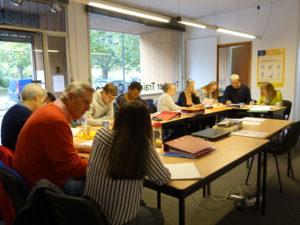
A TEFL Toulouse theory session
Here’s an example of a typical day:
| 9.00am – 10.40am | Input session 1 |
| 11.00am – 12.45pm | Input session 2 |
| 12.45pm – 2.00pm | Lunch break |
| 2.00pm – 3.30pm | Lesson planning help time |
| 3.30pm – 5.40pm | Teaching practice and observation |
| 5.50pm – 6.30pm | Teaching practice feedback |
Coursework, assignments, things to do at home
You’ll complete most of your coursework at our training centre during the working day, but the intensive nature of the course means that you will also need to spend a part of most evenings and weekends doing some home study and preparing lessons. Our TEFL course does not include as many assignments (ie work to be done at home) as some other TEFL courses, as we prefer to get as much as we can done during the day together as a group and with the staff onsite to help.
Contained in the course price
- 5 weeks of tuition from our DELTA / MA qualified teacher trainers
- All course materials – mainly paper based
- For successful graduates, the official Certificate in TEFL from IATQuO, numbered and stamped, showing completion of the course, and a certificate from us, highlighting your performance and providing an explanation of grades
- Welcome drinks evening, and end of course celebrations including champagne and meal in a restaurant
- Lifetime job guidance and CV help wherever you are in the world
- Free accommodation finding service

